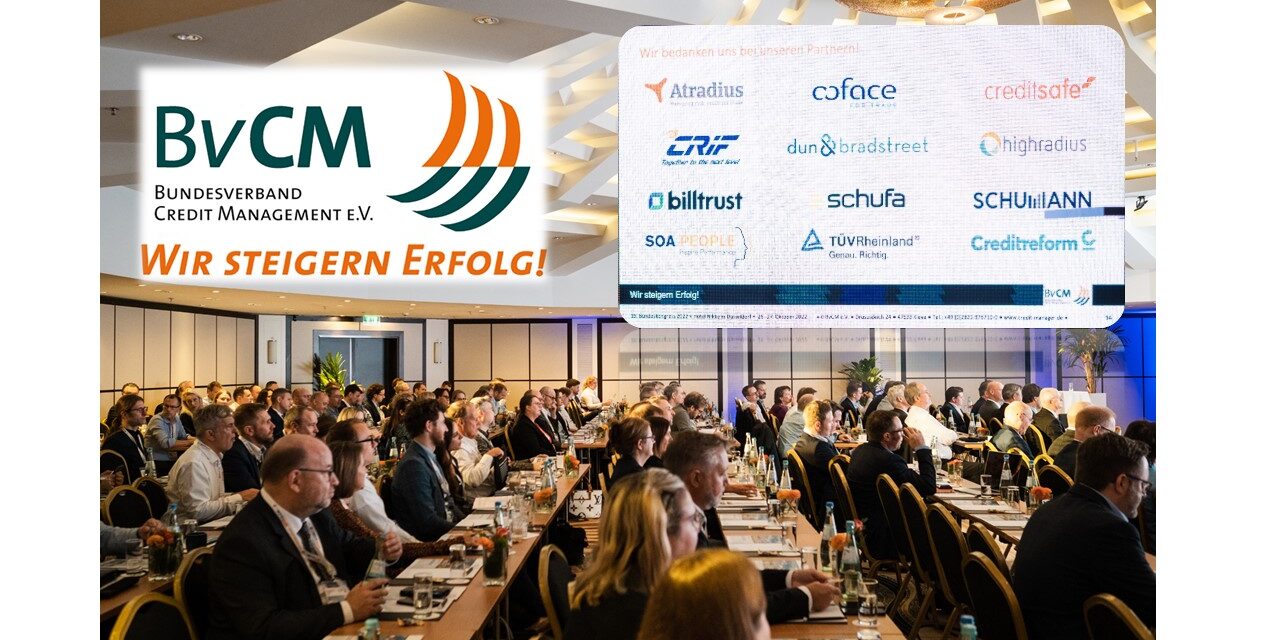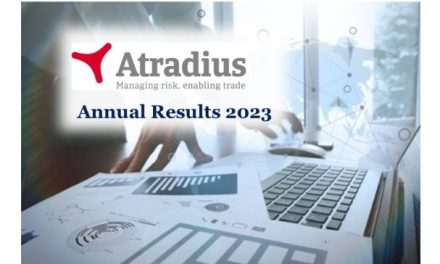Fast and decisive action: that is the advice of Dr. Marcus Optendrenk, Minister of Finance of the State of North Rhine-Westphalia, to the participants of the 19th BvCM Federal Congress. An advice that was repeated and reinforced at several occasions in the congress program. Certainly the right attitude in view of the impending crises. Around 230 participants found their way to the Hotel Nikko in Düsseldorf. “I’m pleased to see full rows again,” emphasized BvCM President Rudolf Keßler at the start of the program. After two years as an online event, the 2022 congress again offered the opportunity to exchange ideas in person.
A winner kicked off the content of the congress: Andreas Schmitt CCM, Director of Group Credit Management at Rational AG. In 2019, Credit Management of the company’s excellence in Credit Management Award.
How can you ensure excellent credit management and develop it further in times of crisis?
Schmitt dealt with this question in his speech: “I was often asked by the participants of the CCM qualification whether the present time is allowing the further development of credit management systems or whether it is better to react in a situational manner,” says Schmitt. For him, the answer is clear: The systems need to evolve. The reasons: On the one hand, there are current crises such as Corona, supply bottlenecks, the Ukraine war or the inflation. It is necessary to act with creative credit management quickly and react flexibly. At the same time, there are megatrends such as digitization, skills shortages or the ESG requirements that require a strategic approach. “And on that we must be prepared regardless of the current crises, opportunities and weigh risks. And exactly for that we have to further develop our systems.”
The interactions between crises and megatrends create uncertainties Is Zombie dying coming? Are becoming supplier credits more important? Are target groups shifting? Is the underwriting behaviour of credit insurers changing? That is why credit management must be prepared for a wide variety of scenarios, according to the motto “Hope for the best, be prepared for the worst”. Dunning processes must be streamlined and sales processes must be integrated, that needs an advanced decentralization. “Decentralization also helps against the shortage of skilled workers,” says Schmitt. In addition, the credit management team from Rational has developed its own score for customer evaluation, in order to be able to grow with top customers.
Conclusion: “It is not just about crisis management, but about permanent further developments. We have to be able to weigh up opportunities and risks. So yes, we have to develop our systems further.”
Strengthen Resilience
The first panel discussion centered on the title of the congress: “With sustainable credit management the resilience of companies Strengthen.” Tina Haus-Bienerth, Head of Corporate Credit Management at BayWa AG, and Dr. Werner Grünewald, Founder GrünewaldConsult took over moderation: To the initial question “Is the economy already in a recession?” replied Dr. Martina Städtler-Schumann, CEO of Prof. Schumann GmbH: “We are not yet seeing the crisis among our customers, however there are increasing signs that it will become more difficult in the middle of next year. Then it is important to be agile in your head and to act quickly.” Thomas Schulte, Head of Credit Management Henrich Baustoffzentrum reported: “At the moment things are going even better than in 2021. However, housing constructions will be reduced; the road construction and public building projects are still ongoing. I don’t see black, but I look to the future overall with confidence.”
Klaus Heger, head of debtor management at electrical wholesaler Sonepar Germany, sees the situation similar: “The creditworthiness of the customers has not deteriorated yet, however we expect problems in the next two years.” Then quick and decisive action is called for. Credit decisions should then take no longer two days in in taking advantage – also because opportunities can be used. “We still have room for improvement with some customers. To use the potential we need other information as before. That is why we regularly talk to the credit insurance companies and share our knowledge, look for solutions together. Especially in the renewable energy sector, we often deal with start-ups. That is where opposite us are managing directors in hoodies and hats, who need a limit of two million euros. The human factor plays an important role there.”
Professionalized Cooperation
Frank Liebold, Country Director Germany at Atradius Kreditversicherung, confirmed the development: “The cooperation with the customers has become more professional. The digitalisation creates free spaces for large customers. We have to rethink this as well. This is why our underwriters are focused on specific industries to better understand the customer’s business. They gain experience and build expertise. Basically, the communication with the customers is important. We must also explain why we don’t underwrite certain risks.” Christian Stoffel, CCO Coface Northern Europe, made a similar statement: “The world has changed. The Credit limit decisions are more agile and automated – whereby the human factor is often essential. Anyone who talks to each other can to be supported. That is why the dialogue with customers is so important. If we know how their credit management is designed, we can take it from there. Alternatively, if a customer, for example, is facing problems caused by a hacker attack, we have to find as partners a solution for further proceedings. Also in Coface our employees are working industry focused.”
A question for the practitioners was directed by Dr. Grünewald: “Are you going to expand your coverage? Increased reliance on credit insurance or factoring or tackle the supply chain?” Klaus Heger emphasized that Sonepar is using already today a whole bunch of measures – except factoring. Thomas Schulte added: “Since the financial crisis of 2008, we have been using a colourful mix of measures that we be able to switch on as needed.”
To the question “Where will we be in a year?” all participants were asked to make a short closing statement. Dr. Martina Städtler-Schumann: “We will face and have to handle new international constellations.” Klaus Heger: “Don’t know what may come, but one has to remain positive.”
Frank Liebold: “I hope that in a year no one will have to die in Ukraine.” Thomas Schulte: “Our industry is confident in spite of everything.” Christian Stoffel: “With resilience we will get through Corona and navigate through the other crises – and see you again in a year at the 20th Federal Congress of the BvCM.”
Sales increased, accounts receivable reduced
Another highlight of the first day of the congress was the presentation of the Excellence in Credit Management Awards. This year the prize went to das Credit management team of the electrical wholesaler Sonepar Germany. “Our reputation in the company has changed over the past few years, from the supposed sales preventer to a sales partner,” emphasized Klaus Heger, Head Accounts receivable management at Sonepar Germany GmbH, within the framework of award ceremony. The enterprise is part of the France based Sonepar Group. 500,000 products from 2,000 manufacturers, 150,000 transactions per day and 5,000 employees in 199 branches, who have enabled the 3.2 billion Euros in sales per year: numbers that underline the importance of the Credit Management in the company. “In the past few years, we could increase our revenue 30 percent can,” reported Heger. Therefore, investments had to be made in structures, systems and resources for professional credit management. The number of employees in accounts receivable grew from 45 on 53. The company’s credit management existed with the much cited “paper economy” 20 years ago. An accounts receivable management system was introduced in 2007, 2012 followed by SAP and in 2019 by a CRM system – all backed by an internal credit policy. In addition, there are now partnerships with credit insurers, credit bureaus and other service providers.
Decentralized
An important basic idea: “Our accounts receivable management is decentralized organized. I am convinced that accounts receivable have to be managed where the customers are”, explains Heger. The enterprise has three warehouse locations in Germany, each with its own accounts receivable department attached. “With the three department heads we have very short communication channels, we meet regularly. So far we have done very well.” The successes speak for themselves: In the past ten years the proportion of bills with sales days outstanding of more than 90 days, could be reduced from 1.4 percent to 0.4 percent – while the absolute number of invoices has grown significantly. “This development demonstrates our completely different reputation in our company. In a figurative sense, the door was slammed in our face in the past. While today, we are considered supporters for Sales. There is still a way to go; the next tasks are already waiting. During the Covid 19 period the fourth warehouse was opened in Germany, the fifth is in the planning phase. Both have to be successively integrated into the credit management environment. Therefore, those receivables can be reduced even further – while revenue continues to rise.
“Our heart beats for the weaker ones”
The second day of the congress started with two different minimum requirements. First, it was about data protection in credit management, which is becoming increasingly important. That is why Stephanie Iraschko-Luscher, head of the BvCM data protection-working group, and her deputy Christian Huth, presented the new minimum requirements for the Data protection in credit management. Especially interesting for the congress participants was the appearance of the data protection officer from Hamburg, Department of Economics, Eggert Thode. “Our heart beats for the weaker ones, who are not able to put up a fight,” emphasized Thode. In concrete terms, this means that the authority monitors the processing of personal data, namely especially in the B2C sector. Especially in receivables and credit management a lot of data is processed, which requires great care.
Does not want to be in the way
“It becomes particularly critical, if a customer not did not pay and additional data exchanged between different bodies is required. It becomes very critical, if for example the wrong receivable had been forwarded to the wrong person,” says Thode. The exact purpose about the use of the data are very often not transparent. On the other hand, the data protection does not want to be in the way of the legitimate interests of the company. “No one should be prevented to receive his money. It is more about checking how that Service providers such as collection agencies act. Are they active on Facebook, do they communicate via WhatsApp or do they do 1-cent transfers? I would like to encourage you to approach us proactively with all questions.”
The two heads of the working group then handed over the first copy of MaDic 2.0 to BvCM President Rudolf Kessler. “The paper had been created according to the BvCM philosophy by members for members. They told us where the proverbial shoe pinched,” explained Christian Huth. “Does data protection hinder our work? No, on the contrary. If you stick to the rules, there won’t be any problems,” added Rudolf Kessler. Stephanie Iraschko-Luscher made it clear: “The working group will continue to work. It will also be about practical solutions in the future. She gratefully answered a question from the audience about the relevance of scores to data protection: “A very important topic, which we will definitely deal with.” Protection against hacker attacks and the increasing number of identity thefts will also occupy the working group in the future. “These issues have been relevant to data protection for many years. There is still a lot of persuasion to be done.”
Her conclusion: “I’ll take a lot of topics home with me for our future work.”
Rapid action is crucial
The economy is facing a mixture of the most diverse crises with unpredictable consequences. However, the experts agree on one point: the number of insolvencies will increase in the coming year. The is the right time for the publication of the “minimum requirements for credit management in customer insolvency”. The paper was presented at the congress.
“Our objective was clearly defined. In the past, only the damage was written off in the event of a customer insolvency. Today it is a question of minimizing the damage and possibly even contributing to the economic rehabilitation of the customer by remaining in business. In the best-case scenario, the customer remains the same,” explained attorney Michael Schmidt, head of the insolvency practice-working group, about the intention of these specific minimum requirements. However, this intention was already on the agenda in 2019. Due to Covid-19, however, the further development of the minimum requirements had to be delayed. Angelika Fromme, Head of Debtors and Credit Management at Konica Minolta Business Solutions Deutschland GmbH invited some month ago the working group to finalise the paper. 45 participants accepted the invitation. “We were thrilled,” emphasized BvCM President Rudolf Kessler. After a few very constructive and efficient meetings, the work was done.
“I think the result is impressive. We received many questions and good input from the BvCM, which is why these minimum requirements also bring the philosophy ‘by members for members’ to life,” stated attorney Matthias Marzluff, also head of the insolvency practice working group.
Implement quickly
“It is important that the minimum requirements are implemented quickly in the company. In the event of a customer’s insolvency, it is not enough to pull the reference book out of the drawer and look for a solution. You have to be prepared,” stressed Attorney Michael Schmidt. “Please take your employees with you! The subject is dry though; but you can only take the necessary immediate measures in an emergency if you are well prepared,” added Attorney Matthias Marzluff. In the event of a customer is going bankrupt, for example, security rights would have to be asserted immediately, delivery stops imposed and all departments in the company informed. In addition, it must be determined directly what the situation is towards the customer: How high are the outstanding debts? What deliveries are on the way to the customer? What is being produced for him right now? Speed is the key.
The complete minimum requirements can be ordered from the BvCM office in Kleve. www.credit-manager.de
The second part of the conference report will follow in the next issue. Then it is about  the second discussion round of the first day with the German Commercial and Consumer Credit Bureaus and reports from the workshops from the second day.
the second discussion round of the first day with the German Commercial and Consumer Credit Bureaus and reports from the workshops from the second day.
Source: (German language) BvCMCreditManagerNewsletterPage6to11
![]() Editorial Comment: BIIA thanks the BvCM for inviting BIIA to participate in the conference.
Editorial Comment: BIIA thanks the BvCM for inviting BIIA to participate in the conference.




























